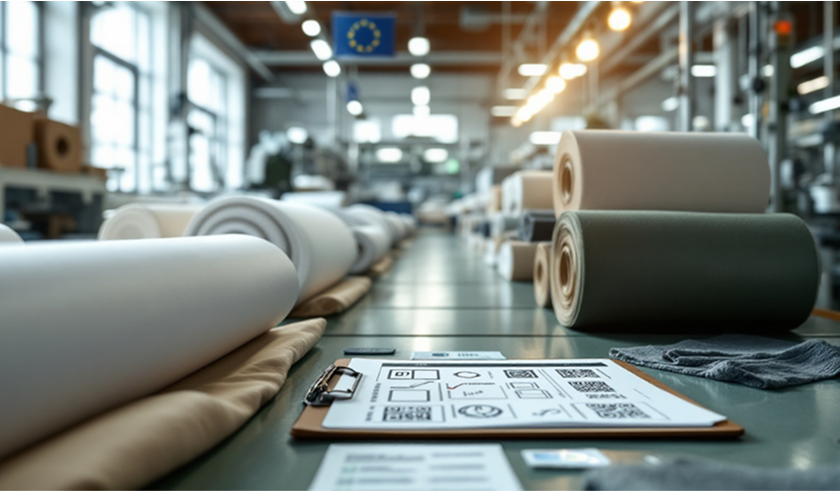The New Era of Compliance: Understanding ESPR's Impact on the Textile Industry
Procurement, Technology
Teesta Mukherjee
ESG Solutions Director

INTRODUCTION
The Ecodesign for Sustainable Products Regulation (ESPR) officially came into force on July 18, 2024. This regulation replaces the previous Ecodesign Directive (2009/125/EC) and introduces broader eco-design criteria aimed at making sustainable products the norm in the EU market.
The focus of ESPR is primarily pushing industries to enhance product sustainability by achieving durability, repairability, recyclability, further prohibiting unsold product destruction. The regulation also includes provisions for the Digital Product Passport (DPP), which provides transparency regarding a product's environmental performance.
The ESPR represents a transformative and revolutionary step in sustainable product design within the European market. A crucial part of the European Green Deal and the Circular Economy Action Plan, the ESPR will usher in a larger conversation within the manufacturing and textile industry to enhance their sustainability credentials in line with the evolving circular economy.
- Effective Date: The ESPR came into effect on July 18, 2024.
- Future Steps: The first working plan under the ESPR is expected to be adopted by April 19, 2025, which will outline specific product groups that will be subject to new ecodesign requirements.
UNDERSTANDING ESPR
The ESPR has established new benchmarks for product sustainability by introducing requirements that go beyond energy efficiency alone. Achieving durability and recyclability will minimize use of hazardous substances and additionally the Digital Passport Product (DPP) will equip businesses with relevant information regarding a product’s environmental footprint.
The ESPR builds upon the foundation laid by the European Ecodesign Directive (Directive 2009/125/EC), which established ecological standards for specific product groups within EU member states. This directive worked in conjunction with the Energy Labeling Regulation, governing energy efficiency labeling for products like refrigerators and washing machines.The previous directive successfully reduced energy consumption by 10% in regulated products in 2021, saving consumers approximately €120 billion in energy costs.
The ESPR marks a significant evolution in environmental policies within Europe by addressing broader environmental impacts of products, impacts that go beyond energy efficiency. By introducing stricter guidelines on product durability and recyclability, a circular economy can be promoted ensuring that products sold in the EU are designed with their entire life cycle in mind, encouraging reuse, repair, refurbishment and recycling.
HOW ESPR AFFECTS THE TEXTILE INDUSTRY
With its scope broader than its predecessors, the ESPR has the potential of a direct positive impact on the textile industry. It mandates the extension of the product life cycle, reduction of environmental footprints and stringent environmental compliance positioning sustainable brands more favorably in a market, ambitious to reach Net Zero.
- a. Impact of ESPR on Brands: Brands must adapt their sourcing and production processes to comply with ESPR standards. This includes but is not limited to rigorous documentation of sustainability practices, supply chain transparency and adherence to compliance, failure to do which can result in loss of market access and heavy penalties.
- b. Impact of ESPR on Textile Manufacturers: The ESPR is designed to increase a product lifeline, this mandate extends to the textile industry too. These ecodesign requirements will push manufacturers to keep their environmental footprint in check, minimize carbon emissions and further increase recycled content in their products. This will not only help reduce environmental footprint but also position such manufacturers favourably among brands who are strongly trying to source more sustainably.
ALIGNING WITH ESPR: HOW PROCURECIRCULAR CAN HELP
A key element of the ESPR is increasing transparency within the textile industry. Its guidelines on comprehensive reporting requirements, supply chain transparency, reducing waste via the destruction of unsold products along with its strong alignment to the principles of Circular Economy, collectively aims at creating a more accountable textile sector within the EU market. Parallelly, its introduction of the Digital Product Passport is crucial, as it mandates 100% transparency, enhancing both supply chain transparency and better-informed choices.
At ProcureCircular, we carefully take into consideration important regulations such as the ESPR and have designed our offerings in line with it. Our smart and intuitive data driven platform offers tailored solutions to support textile manufacturers through our 4 main services:
- LCA and GHG Reporting: We have partnered with experts who provide a 360-degree intervention in mapping 8+ parameters of environmental impacts across the product Life Cycle under ISO 14040 and ISO 14044 while also mapping their Scope 1,2 and 3 emissions with tailor made reporting and solutions
- Sustainable Material Sourcing: We provide access to 1000+ materials of the highest quality and standards directly on our marketplace (including deadstocks and end-of-run materials) , ensuring 100% supply chain transparency and waste reduction, in compliance to ESPR requirements.
- Digital Product Passports (DPP): A cornerstone of ESPR, ProcureCircular assists brands and textile manufacturers in creating DPPs for final products, providing comprehensive sustainability information that aligns with regulatory requirements.
- Waste audits: We conduct waste audits across value chains and for clients globally, with the aim to bring down the company waste footprint to zero. Our process includes collecting samples, creating marketing material, measuring waste production KPIs, and creating a baseline for businesses to understand and improve their waste management processes.
- Advanced Pack Features: Our advanced pack includes environmental indices on carbon, water usage, waste management, and chemical use displayed on an intuitive dashboard, enabling informed decision-making.
ProcureCircular’s Digital Product Passport: A Gateway to Sustainable Product Information
One of the reasons for ESPR to be crucial within the manufacturing and textile industry is the introduction of the DPP which provides in-depth information regarding a product’s source, environmental footprint, materials used and its overall performance. This transparency can improve supply chain accountability and responsible decision making besides contributing to the reduction in the overall footprint of the textile industry .
- Comprehensive Data: It collects essential information throughout a product's lifecycle, such as unique product identifiers, materials used, technical specifications, and environmental impact data. This helps stakeholders understand the resource consumption and sustainability attributes of products.
- Accessibility: The DPP is designed for accessibility to all stakeholders, including consumers. This fosters trust and encourages informed purchasing decisions.
- Regulatory Compliance: Under the ESPR, implementing DPPs is mandatory for regulated products in the EU market. This ensures that businesses meet sustainability standards while providing necessary documentation for compliance.
- Support for Circular Economy: By detailing recycling options and repairability, the DPP facilitates better reuse and recycling practices, contributing significantly to a circular economy.
- Average Distance Travelled: Evaluating transportation impact associated with sourcing materials.
- Compliance Score: Measuring adherence to relevant sustainability regulations and standards.
- Recyclability: Assessing how easily a product can be recycled at the end of its life.
- Traceability Score: Ensuring that all materials can be traced back through the supply chain to verify their sustainability credentials.
- Effective Date: The DPP as a part of the ESPR, officially came into effect on July 18, 2024. This regulation aims to make sustainable products the norm in the EU market and significantly enhances product transparency.
- Future Steps: The first working plan under the ESPR, which will outline specific product groups subject to new ecodesign requirements, including those that will utilize the DPP is expected to be adopted by April 19, 2025. This plan will prioritize high-impact products, including textiles, electronics, and construction materials, ensuring that sustainability measures are effectively integrated into their design and lifecycle management.
CONCLUSION
By signing up for ProcureCircular's services, both brands and textile manufacturers will be better assured and empowered to significantly streamline their compliance processes while simultaneously enhancing product offerings in line with market demands. Our platform equips businesses with the tools necessary to navigate the complexities of regulations such as the ESPR more effectively. This proactive approach not only fosters innovation within your operations but also boosts marketability among eco-conscious consumers who are increasingly seeking sustainable options.
Adapting to regulations such as the ESPR is essential for the textile industry to flourish and thrive in the long term. With growing demand around transparent communication, supply chain accountability and improvement of environmental indices of end products, brands embracing these changes will be able to position themselves more competitively in the circularity market. By leveraging ProcureCircular’s comprehensive suite of services including our Circular Marketplace, LCA reporting, GHG reporting, waste auditing, and Digital Passport Product Creation, brands can benefit both in terms of compliance and growth.
Explore ProcureCircular’s offerings today to stay ahead of the curve and ensure your products meet tomorrow’s standards.








